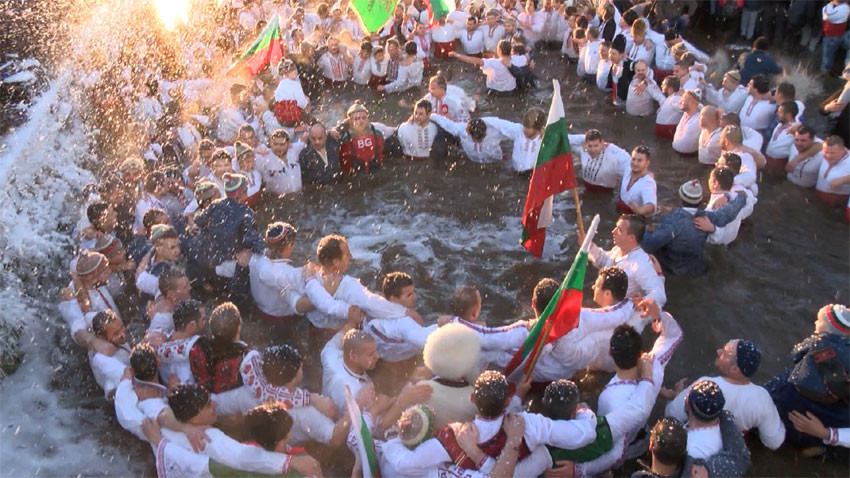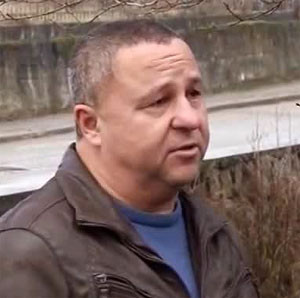
Once again on Epiphany - January 6, Bulgaria’s Kalofer will wake up under the sound of drums and bagpipes. Traditionally, men from the town enter the icy waters of the Tundzha River to play their festive horo (a type of chain dance). The ritual is part of an Orthodox tradition that is observed in all the towns and villages of the country – on Epiphany water of rivers and basins is sanctified by the immersion of a cross in it. A priest throws a cross into the water and men jump in it to get the crucifix. Anyone involved in the symbolic "saving of the cross of Christ" believes that this would give him health and strength for the whole year. Hundreds of men traditionally participate in the ancient ritual in the town of Kalofer, but they not only enter the waters of Tundzha, but dance. Every participants goes early in the morning to the mayor’s home and then to the river. People believe that if geranium the priest holds froze, the year would be fertile and full of happiness. Here competition for the cross is not important as it is ultimately given to the youngest participant in the dance. Elderly Kalofer citizens say that when you get out of the water you feel like a new person and no one has ever caught cold.
The ritual has applied for inclusion in the UNESCO list of intangible heritage, so for a second time, along with many tourists to Kalofer, ethnologists from the organization would be watching the dance. This tradition has existed for as long as I can remember, mayor of the town, Roumen Stoyanov, says. Preparation for the dance starts on the evening of January 5. Men warm up with wine, appetizers, hot peppers and bagpipe music.
 “Last year UNESCO observers told us that it was imperative that the ritual be performed only by local residents. That's the beauty and we deserve to apply for a place in the list of intangible wealth. The authentic ritual has brought many tourists to the town, so the event is socially significant. This year I see that more and more organized groups come to Kalofer especially for the holiday. But I call on everyone to first let men from Kalofer perform their dance in the water before entering the river themselves. I know everyone wants to present their songs and traditions and no one will stop them, but the ritual must first be performed by the Kalofer citizens. We want to protect our customs and do not want them to disappear because of the influx of tourists. I remember the people who first started entering the river with their bagpipes more than 30 years ago, but it has become a tradition since then and people like it very much. Therefore, I invite all people from Kalofer to feel the unity on this holiday. Once there was no place in the river for Kalofer citizens because of the big number of guests who had come. That's why we're jealous of our tradition, and we are very proud of it.”
“Last year UNESCO observers told us that it was imperative that the ritual be performed only by local residents. That's the beauty and we deserve to apply for a place in the list of intangible wealth. The authentic ritual has brought many tourists to the town, so the event is socially significant. This year I see that more and more organized groups come to Kalofer especially for the holiday. But I call on everyone to first let men from Kalofer perform their dance in the water before entering the river themselves. I know everyone wants to present their songs and traditions and no one will stop them, but the ritual must first be performed by the Kalofer citizens. We want to protect our customs and do not want them to disappear because of the influx of tourists. I remember the people who first started entering the river with their bagpipes more than 30 years ago, but it has become a tradition since then and people like it very much. Therefore, I invite all people from Kalofer to feel the unity on this holiday. Once there was no place in the river for Kalofer citizens because of the big number of guests who had come. That's why we're jealous of our tradition, and we are very proud of it.”
We have never specifically invited people to come for the holiday, everything is spontaneous and voluntary. Every year the number of people willing to be part of the horo gets bigger. Not less than 150 people from Kalofer are part of the horo and we all feel great unity, Rumen Stoyanov says and adds:
“I personally have been involved in the ritual for more than ten years now. I have never felt fear. On the contrary, the mood conquers us and helps not feel the cold. I also know that on this day the water is sanctified and no one has ever got ill. Actually, everyone involved remains healthy, energetic and able to work during the whole year. That is why I never miss to take part in the tradition.”
English: Alexander Markov
Photos: BGNESMinutes before the second and final reading, at the parliamentary budget and finance committee, of the state budget for 2026, the leader of the biggest party represented in parliament GERB Boyko Borissov halted the procedure and sent the draft bill..
Despite being in Bulgaria’s poorest region, the North-West, Vratsa Province ranks among the top three in the country for economic development. According to 2023 data from the National Statistical Institute (NSI), it shares third place with Varna on the..
Bulgarian artists will take part in the festive Christmas concert in Stockholm , organised with the European Commission's representation and embassies , the Bulgarian embassy in the Swedish capital announced on Facebook. The event is scheduled for 8..
Despite being in Bulgaria’s poorest region, the North-West, Vratsa Province ranks among the top three in the country for economic development. According..
Bulgarian artists will take part in the festive Christmas concert in Stockholm , organised with the European Commission's representation and embassies ,..
Minutes before the second and final reading, at the parliamentary budget and finance committee, of the state budget for 2026, the leader of the biggest..

+359 2 9336 661
